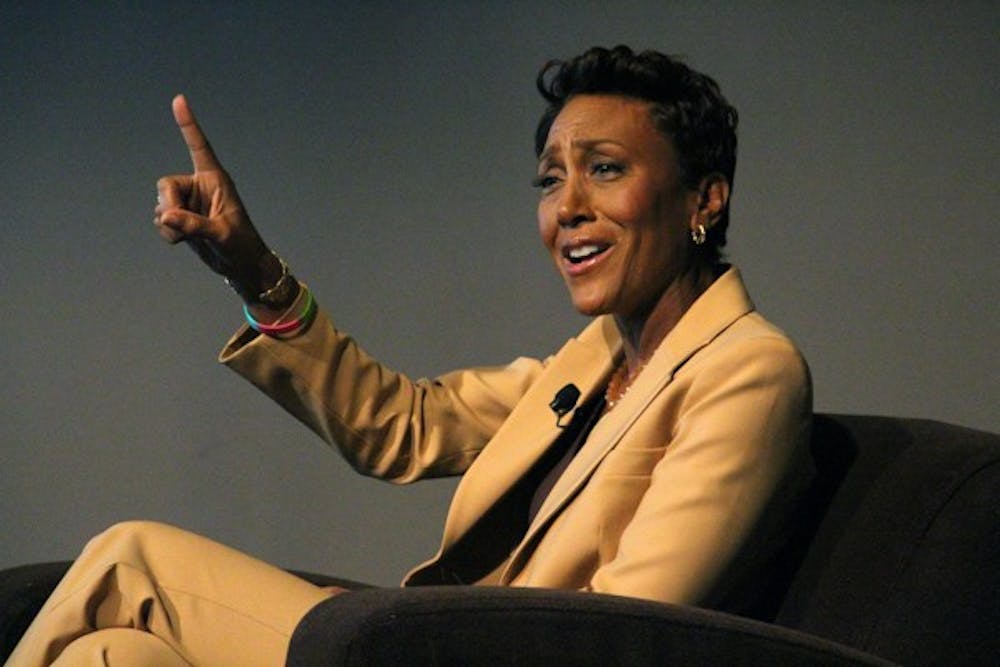 "Good Morning America" anchor Robin Roberts speaks to students of the Cronkite school and answers questions about her career, health and ambition Oct. 5 in Phoenix. Robin Roberts is this year's recipient of the Cronkite Award. (Photo by Tynin Fries)
"Good Morning America" anchor Robin Roberts speaks to students of the Cronkite school and answers questions about her career, health and ambition Oct. 5 in Phoenix. Robin Roberts is this year's recipient of the Cronkite Award. (Photo by Tynin Fries)ABC’s “Good Morning America” anchor Robin Roberts told students social media has increased audiences' awareness of news stories, but in-depth reporting can tell a story on a more complex level.
“What remains the same is storytelling," she said. "Good, great storytelling."
Roberts spoke to students of the Walter Cronkite School of Journalism and Mass Communication in the First Amendment Forum on Sunday.
Cronkite assistant dean Mark Lodato interviewed Roberts, the 2014 recipient of the Walter Cronkite Award for Excellence in Journalism, about her career, personal journey and advice for students planning on entering the journalism industry.
“Optimism is a muscle that gets stronger with use,” Roberts said, speaking about the positive viewpoint she has maintained throughout her fight against breast cancer and myelodysplastic syndromes, as well as her perseverance against obstacles in the journalism industry.
Roberts began her career as a sports journalist when she realized she didn't have the ability to pursue a career as a professional athlete, she said.
Although Roberts dreamed of competing in the Wimbledon Championships for tennis, she was equally content to have covered the event for ESPN, she said.
“Having a microphone instead of a tennis racket in my hand was just as rewarding,” Roberts said.
Throughout her time as a sports journalist, Roberts faced race and gender discrimination, as well as discrimination based on her sexuality, though she defied these stereotypes to become a successful ESPN reporter.
“It was very difficult to be a woman, a woman of color, who wanted to be in sports, on television, in the deep south,” Roberts said.
Roberts overcame obstacles in her television career by preparing for each assignment to the best of her ability.
“I would do what I could not to give the opposition ammunition, if you will,” Roberts said.
Roberts did not allow the opinions of her viewers to prevent her from reporting on sports.
“I felt, that when I started at ESPN in 1990, I sensed that I could feel beer cans pelting TV sets all across the nation,” Roberts said.
ESPN viewers gradually came to accept her as a trustworthy sports reporter.
Roberts also spoke about her battle with breast cancer and MDS. Although some criticized her decision to share her health problems with the public, Roberts said she believed she was doing a public service.
“The prayers, the well-wishes, all of that really went a long way in my recovery,” Roberts said.
Her resilience throughout her recovery was due, in part to her friends and family, Roberts said. Her sister, Sally-Anne Roberts, donated the bone marrow that saved Roberts’ life.
“She feels that she was born to save my life,” Roberts said.
Roberts accredited her humility and strength to her upbringing, quoting her family motto, "We may not have everything together, but together, we have everything.”
Roberts said she would never let anyone expect more from her than she expected of herself, and it was her “work ethic and sheer determination,” that set her apart in the industry.
Most Cronkite students and faculty who attended the event were pleased with the presentation.
“She was very authentic, which the students certainly appreciate; and she was open and honest, and seemed truly excited to be here, and excited to engage with all of the students,” Lodato said.
Journalism freshman Allison Bailey said everything about Roberts is natural and that she's down-to-earth.
"She was just so honest with her answers, and really inspirational,” Bailey said.
Roberts concluded her presentation by encouraging the students of the Cronkite school to be curious, to be authentic and not to be afraid.
“You can lose a game, but you still may win the championship, you still may go on,” Roberts said.
Reach the reporter at ekamezak@asu.edu or follow her on Twitter @emikamezaki
Like The State Press on Facebook and follow @statepress on Twitter.




